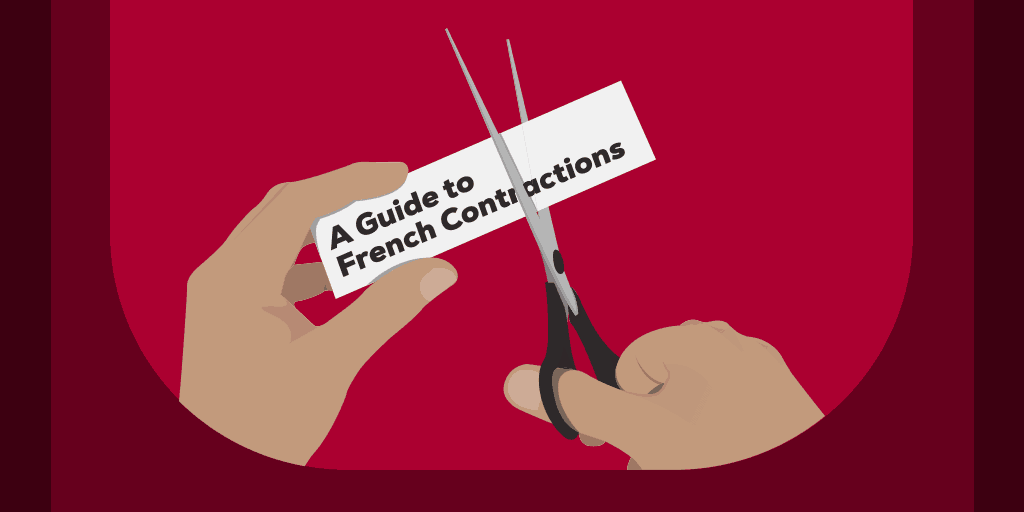French words often appear with contractions. But unlike in English where you can choose to say “I'm” instead of “I am” or “you’d” instead of “you would” depending on the formality of your tone, in French you have no choice about it. You see, French contractions are mandatory. If the words call for a contraction, you contract it. There’s simply no other way.
But what are the kind of French words that need contractions? And when should you use them?
Here in this article, let’s learn all about French contractions and see how we can simplify the rules to make contractions in French as easy for you to remember as possible.

Before we jump into the meat of this lesson, first, let’s ask ourselves:
What are French contractions?
French contractions are two or more words combined together where a letter (or more) is removed. The omitted letter is often replaced with an apostrophe. You see it in common French phrases: je t’aime, c’est la vie, je m’appelle…and so many others. But perhaps you’ve wondered if there are rules behind it?
The good news: Yes there are guiding rules on French contractions! And, yes, we’ll discuss them shortly.
What French words need contractions?
Here are the French words that you need to remember when it comes to French contractions.
1. The singular definite articles le and la
When le and la are followed by a vowel, h muet (silent h), or the pronoun y, the vowel in le and la are omitted and they are lumped in together with the second word.
For example:
Still Stuck at Intermediate French?

Break through the plateau with our proven coaching and study method.
2. Single consonant French words that end in e muet (silent e): ce, de, je, le, me, ne, que, se, te
When these nine single consonant words that end in silent e are followed by a word that begins with a vowel, silent h, or the pronoun y, the silent e are dropped and the two words are contracted.
| Single consonant word that end in e muet | What it means | Example contractions | What the example means |
|---|---|---|---|
| ce | this | C’est | It is / this / that |
| de | Of / from | d'Amérique | Of America |
| je | I | j’aime | I love / I like |
| le | Him / it | je l'aime | I love it |
| me | myself | Je m’appelle | My name is (literally: I call myself….) |
| ne | not | Il n’est pas là | He is not here |
| que | That / what / whom | qu’il | that he |
| se | oneself | ll s’appelle | His name is (literally: he calls himself…) |
| te | You / to you | Je t’aime | I love you |
3. The French conjunctions puisque and lorsque
These two conjunctions which mean since / because / as (puisque) and when / while / as soon as (lorsque) becomes shortened into the following:
4. The French preposition or adverb jusque
Jusque means until or too, and this word is also contracted when it is followed by a word that begins with a vowel.
Still with me so far?
Okay, good.
5. French prepositions à (to, at, in) and de (of, from, about)
Le and les
A contraction will be formed when these two common French prepositions are followed by the definite articles le and les.
Let’s take a look.
Quick note:
1.When la and l’ follows à and de, there are no contractions. This means:
2. When le and les are used as object pronouns instead of definite articles, there are no contractions.
Lequel
À and de also contract with the different forms of lequel (which one).
Quick note:
When laquelle follows à and de, there are no contractions. This means:
6. Fixed contractions
There are some words that are always contracted. It’s just the way they are. Here are some of them:
Contractions in Informal French
Let’s back up to what I said earlier in the first paragraph. I mentioned that unlike English where you have a choice to contract when you speak informal English, it’s not the same with French. But actually, there’s a tad bit of similarity here, too.
Language is a growing, changing thing and it adapts to new manners of usage. And yes---like in English, there are instances when you contract words when speaking informally.
Let’s take a look at sample scenarios below.
The contracted ‘tu’
In informal French, ‘tu’ when followed by a verb that begins with a vowel will be shortened to t’. The most common way to do this is with tu as and tu es which become t’as and t’es.
Other examples:
Quick note:
This is a highly informal contraction and only appears in casual spoken conversations among friends. It NEVER appears in written texts such as newspapers, write ups, or other written materials, unless of course it happens to be a text message (SMS) between friends.
Contracted il(s), elle(s), puis, parce que, quelque
Also in informal French conversations, people take liberties in shortening some words and pronunciations. Here are some of them:
But once again, these are highly informal usages. You don’t need to follow these manner of speaking unless you really want to sound as authentic and naturally French as possible.
Learn more about Informal French in this article: The Simple Guide to Informal French GrammarScenarios when you should not contract
Of course, there will always be cases when even though you think you should contract, you just shouldn’t (yep, it sucks like that).
Here’s when you shouldn’t contract:
Quick Recap
Conclusion
So there you go with everything you need to know about French contractions. It’s not so bad, is it? Feel free to review this lesson about contractions in French anytime you want. And if you have some questions about it, don’t hesitate to let me know in the comments section.
Want more French grammar lessons? Check out the French Grammar Mastery Course below.
Still Stuck at Intermediate French?

Break through the plateau with our proven coaching and study method.
Here are some FAQs about French Contractions
How do contractions work in French?
If two particular words are next to each other, they have to contract! Contractions in English are usually two words joined by removing the space between them (a portmanteau, if you will), or by using an apostrophe to remove letters and enmesh the two words in a lingual Frankenstein’s monster. For example, “do” + “not” = “don’t,” and you can probably think of several other similar contractions as well.
In French, there are several contractions. A common French contraction that uses the apostrophe is the contraction of the singular definite articles le or la with a word that starts with a vowel (le + impératif = l’impératif). There are also French contractions that combine two words, but make a completely unexpected new word (à + les = aux). Fixed French contractions will always be in their contracted form; a familiar example is aujourd’hui (au + jour + de + hui), which means “today” in English.
Why do the French use so many contractions?
While contractions in English are optional, French contractions are a must. You must be mindful of the existing contractions and rules in this article in order to master the French language.
Fortunately, you only need to know the six existing contraction rules in proper French that we outlined in this article. English, on the other hand, has many existing contractions that if translated in French, would never be considered proper enough to be written down. So we’ve also included some of these informal French contractions, and there are a lot – about as many as there are slang terms in the English language.
Is du a contraction of de and le?
Yes! This is one of the contractions you can get from combining the preposition de (of, from, about) with the male singular article le (the). Interesting to note, de with les makes des, yet with the feminine article la, it stays as de la.
